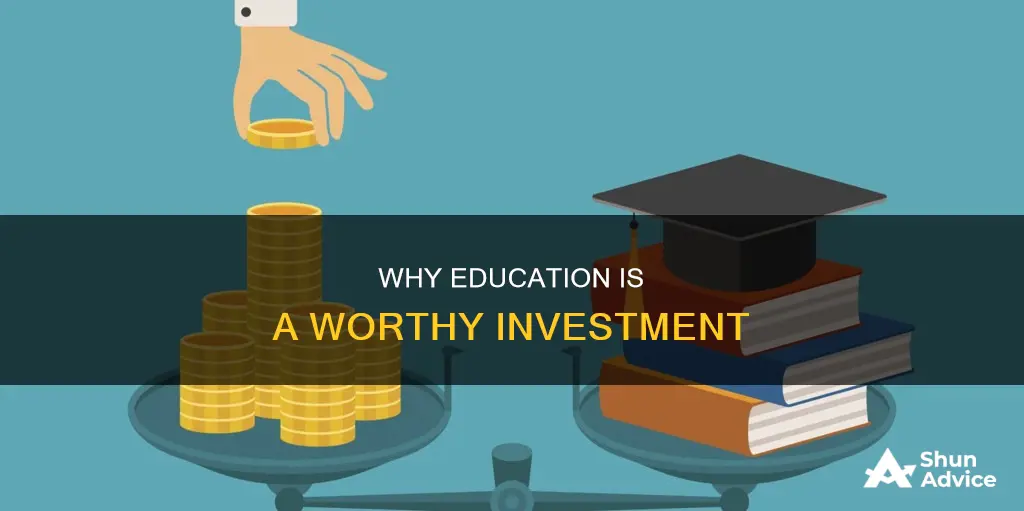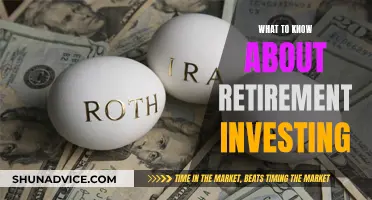
Investing in education is a broad topic that covers everything from early childhood education to higher education and professional development. It involves not just spending money but also investing time and energy. The returns on investment in education can be wide-ranging, from improved career prospects and higher earnings to better health, communication skills, and overall well-being.
Education is an investment in oneself, and it has high returns. It helps individuals develop their thinking, communication, and problem-solving abilities, which are essential for success in any career path they choose. For instance, the unemployment rate for individuals with bachelor's degrees is lower than those with only a high school diploma.
Investing in education also has a positive impact on communities and nations. By levelling up the education sector, it becomes an investment in the health of the nation. Educated individuals tend to live healthier and happier lives, make better decisions, and positively impact the economy. They can also contribute to addressing global challenges, such as climate change.
Furthermore, investing in education can lead to more economic growth for a location. It can break down barriers to education, improve research and development, and foster innovation.
However, investing in education also carries risks. If academic degrees do not translate into occupational opportunities, students may feel they have wasted their time and money. The job market is constantly evolving, and there is no guarantee that the skills acquired through education will remain relevant.
Overall, investing in education has the potential to unlock a world of possibilities, boost careers, expand horizons, and lead to a more fulfilling life. It is a decision that impacts not just the individual but also the community and society as a whole.
What You'll Learn

Higher earning potential
Investing in education can lead to higher earning potential. According to the US Bureau of Labor Statistics, the more you learn, the more you earn. This is reflected in the difference in median weekly earnings for different educational attainment levels. For example, in 2017, workers with the highest levels of educational attainment (doctoral and professional degrees) earned more than triple those with the lowest level (less than a high school diploma). Similarly, in 2020, the median weekly earnings for workers with less than a high school diploma were $619, while those with a high school diploma earned $781.
The unemployment rate also tends to be lower for individuals with higher educational attainment. In 2017, the overall unemployment rate was 3.6%, while the unemployment rate for those with a bachelor's degree was 2.2% and 3.6% for those with a high school diploma. This trend is also observed in data from 2010, where the average unemployment rate for workers with a high school diploma was 10.3%, compared to 7% for those with an associate degree and 5.4% for those with a bachelor's degree.
The higher earning potential associated with education can be attributed to the development of valuable skills and expertise in a chosen field. Obtaining a degree allows individuals to develop their skills through internships, workshops, and seminars, enhancing their credibility and employability. Additionally, investing in education can lead to better career prospects, as certain jobs require specific educational qualifications or degrees.
Education is also an investment in oneself, providing opportunities for personal growth and skill enhancement. It empowers individuals with specialised knowledge, improved communication, problem-solving abilities, and decision-making skills, all of which contribute to higher earning potential.
Furthermore, educational institutions offer built-in professional networks, providing networking opportunities with classmates, professors, and alumni. Networking can open doors to more job opportunities, industry connections, and the potential for career advancement, ultimately contributing to higher earning potential.
Overall, investing in education is a proven way to increase the likelihood of earning more throughout one's lifetime. It opens doors to better career prospects, enhances employability, and provides the skills and knowledge needed to succeed in the job market.
Fear of Investing: Why the Hesitation?
You may want to see also

Networking opportunities
Universities and colleges usually offer strong alumni networks that provide career resources and networking events. These networks can be a great way to get more job opportunities, deepen industry knowledge, grow faster, innovate, and build authority.
Networking can also be done virtually, through social media platforms such as blogs, Twitter, LinkedIn, and Facebook. This allows individuals to connect with like-minded professionals, share insights, and gain exposure.
Additionally, networking can lead to societal change. For example, #WomenEd is a network that aims to tackle inequalities by connecting aspiring and existing women leaders in global education.
Overall, networking opportunities provide individuals with the chance to improve their skills, re-ignite their motivation, work with like-minded peers, and find new career paths.
Forging Checks: A Risky Investment Gamble
You may want to see also

Personal development
Investing in education is a crucial aspect of personal development, offering numerous benefits that extend beyond the classroom. Here are some reasons why investing in education is essential for personal growth:
Enhancing Knowledge and Expertise
Continuous learning allows individuals to expand their knowledge and become subject matter experts in their chosen fields. By staying updated with the latest trends and advancements, professionals can gain a competitive edge. For instance, a software developer who continuously learns new programming languages will be more adaptable to industry changes.
Unlocking Career Opportunities
Investing in education opens up a range of career paths. Employers value proactive individuals who are committed to expanding their skill set. Continuous learners are often seen as motivated, adaptable, and capable of taking on new challenges, leading to promotions, salary increases, and career advancements.
Personal Growth and Confidence
Acquiring new skills and knowledge boosts self-esteem and empowers individuals to step out of their comfort zones. For example, attending public speaking workshops can enhance communication skills and increase confidence when presenting in front of an audience.
Networking and Collaboration
Investing in education often involves interacting with like-minded individuals and experts in the field, fostering meaningful connections and opening doors to new opportunities. For instance, attending a coding boot camp helps individuals learn new programming skills and network with potential employers and mentors.
Adaptability to Change
The world is constantly evolving, and industries are being disrupted by technological advancements. Continuous learning enables individuals to adapt to these changes and remain relevant in the job market. For instance, acquiring digital literacy skills will help navigate an increasingly technology-driven world.
In conclusion, investing in education is a cornerstone of personal development, offering enhanced knowledge, improved career prospects, increased self-confidence, valuable networking opportunities, and the ability to adapt to change. By embracing continuous learning, individuals can unlock their full potential and create a fulfilling future.
Middle-Aged Investors: Saving Enough?
You may want to see also

Job security
Investing in education can lead to more job security for several reasons. Firstly, it increases employability and earning potential. Obtaining a degree or developing specialised skills and knowledge through education can lead to higher salaries and better career prospects. This is because employers tend to seek highly qualified individuals with broad skill sets and deeper knowledge in their respective fields.
Secondly, education can act as a safety net during uncertain economic times and labour market changes. For example, during the COVID-19 pandemic, those with higher levels of education often experienced greater job security. Additionally, countries with a larger proportion of educated workers tend to have faster economic growth, which can positively impact job security.
Thirdly, education improves employability by enhancing soft skills such as communication, punctuality, organisational skills, and productivity, which are essential for success in any career path. It also helps individuals develop critical thinking, creativity, and problem-solving abilities, making them more adaptable and valuable to employers.
Lastly, education can foster networking opportunities and connections that can lead to future job prospects. Educational institutions often have strong alumni networks and provide mentorship opportunities with professors, enhancing job security.
Overall, investing in education can provide individuals with the skills, knowledge, and connections necessary to navigate the dynamic job market and increase their job security.
Theranos Investors: Medical Backgrounds?
You may want to see also

Better health
Education is a fundamental social determinant of health and is linked to better health outcomes. Adults with higher educational attainment tend to live longer and healthier lives than their less educated peers. The association between education and health has grown dramatically in the last four decades. People who have not graduated high school are more likely to report being in fair or poor health compared to college graduates.
The relationship between education and health is bidirectional. Poor health can put educational attainment at risk. Conditions throughout people's lives, beginning in early childhood, can affect both health and education.
Income and Resources
Income has a major effect on health. Higher education is associated with better jobs, higher earnings, and greater access to resources that contribute to better health. Families with higher incomes can more easily purchase healthy foods, have time to exercise regularly, and pay for health services and transportation. Conversely, the job insecurity, low wages, and lack of assets associated with less education can make individuals and families more vulnerable during hard times, leading to poor nutrition, unstable housing, and unmet medical needs.
Social and Psychological Benefits
Education builds social and psychological skills that are important for managing life's challenges and one's health. These include conscientiousness, perseverance, a sense of personal control, flexibility, the capacity for negotiation, and the ability to form relationships and establish social networks. Education can also reduce stress by providing individuals with higher incomes and sparing them the health-harming stresses that accompany prolonged social and economic hardship.
Knowledge and Skills
Education increases health literacy and helps individuals learn about healthy behaviours. Educated patients may be more able to understand their health needs, follow instructions, advocate for themselves, and communicate effectively with health providers.
Healthier Neighbourhoods
Higher education is associated with living in healthier neighbourhoods. People with less education are more likely to live in low-income neighbourhoods that lack the resources for good health. These neighbourhoods often have fewer sources of healthy food, higher crime rates, fewer high-quality schools, and higher levels of toxins and pollution.
Small Investments, Big Returns
You may want to see also
Frequently asked questions
Education is an investment in oneself with high returns. It can help individuals earn more money, get better jobs, and improve their health and confidence. It also opens doors to new opportunities and equips people with the knowledge and skills to succeed in their chosen field.
There are risks involved in any investment, including education. One risk is that the knowledge and skills gained may not be utilised or may not lead to the desired career outcomes. Additionally, the job market is constantly evolving, and individuals may find that their education becomes outdated or less relevant over time.
Investing in education has a positive impact on society by creating informed citizens who can contribute to their communities and the economy. It also helps reduce crime rates and promotes innovation, leading to a better and more prosperous society for all.
There are several types of investments within the educational sector, including infrastructure investments, investments in people through loans and training programs, investments in technology and service models, and investments to consolidate the education ecosystem.







